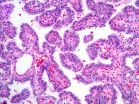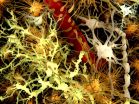(Press-News.org) ANN ARBOR, Mich. — A new comprehensive analysis of thyroid cancer from The Cancer Genome Atlas Research Network has identified markers of aggressive tumors, which could allow for better targeting of appropriate treatments to individual patients.
The finding suggests the potential to reclassify the disease based on genetic markers and moves thyroid cancer into a position to benefit more from precision medicine.
"This understanding of the genomic landscape of thyroid cancer will refine how it's classified and improve molecular diagnosis. This will help us separate those patients who need aggressive treatment from those whose tumor is never likely to grow or spread," says Thomas J. Giordano, M.D., Ph.D., professor of pathology at the University of Michigan Medical School.
Giordano is the project co-lead for TCGA thyroid cancer analysis along with Gad Getz, Ph.D., director of Cancer Genome Computational at the Broad Institute.
Thyroid cancer incidence has increased three-fold over the last 30 years and is the most rapidly increasing cancer in the United States. While the tumors are often slow-growing and easily treated with a combination of surgery, thyroid hormone and radioactive iodine, some patients will develop more aggressive and deadly thyroid cancers.
In this TCGA study, which is published in Cell, the researchers analyzed nearly 500 thyroid cancer samples to identify all genetic mutations that play a role. They found several new cancer genes as well as new variations of existing genes.
Overall, the thyroid cancer genome is relatively quiet, with fewer genetic mutations involved than in other common cancers, the researchers found. This may explain why the disease is often slow-growing.
Fewer mutations meant the researchers were able to look at the signaling pathways involved and understand what drives thyroid tumors. This approach helped them understand the genetic drivers of more of these cancers, reducing the percentage of "dark matter" cases – those with unknown genetic drivers – from 25 percent to 3.5 percent.
Those drivers can be broken down into two primary oncogenic groups: BRAF plus similar mutations and RAS plus similar mutations. But within these two primary groups, especially the BRAF group, several different subtypes of thyroid cancer exist. Currently, all thyroid cancers associated with BRAF, for example, had been considered essentially the same. That's not the case.
"This study integrated a wide variety of genomic data to not only identify cancer drivers, but to compare how these different drivers behave," said Getz, who is also director of the Bioinformatics Program at the Massachusetts General Hospital Cancer Center and an associate professor of pathology at Harvard Medical School. "Interestingly, we found that subsets of BRAF-mutated thyroid cancers are driving cancer through distinct mechanisms, and that some of these subsets are associated with higher risk and less differentiated cancers."
The researchers used this understanding to create measures or scores that can determine how a tumor signals and how aggressive a thyroid tumor is. These scores are being tested in a clinical trial to assess if it can lead to more targeted treatment recommendations.
"These findings are a major step forward in how doctors and patients will address thyroid cancer diagnosis and treatment. Researchers around the world will be using this data, coming back to it and asking other scientific questions," says Carolyn Hutter, Ph.D., M.S., program director in the division of genomic medicine at the National Human Genome Research Institute.
An initial recommendation is for the pathology and scientific communities to consider reclassifying thyroid cancer based on molecular subtypes to better reflect their underlying molecular properties. This would allow doctors to identify the slow-growing tumors from the aggressive tumors and recommend appropriate treatments.
The Cancer Genome Atlas is a federally funded project to understand the molecular characterization of various cancer types. The project has already published numerous signature papers in cancer types such as breast, colon, ovarian and lung. Thyroid cancer includes one of the largest sample sizes, with nearly 500 tumors studied.
INFORMATION:
Funding: National Institutes of Health grants 5U24CA143799, 5U24CA143835,
5U24CA143840, 5U24CA143843, 5U24CA143845, 5U24CA143848, 5U24CA143858, 5U24CA143866, 5U24CA143867, 5U24CA143882, 5U24CA143883, 5U24CA144025, U54HG003067, U54HG003079, U54HG003273 and P30CA16672
Disclosure: None
Reference: Cell, Vol. 159, No. 3, Oct. 24, 2014, DOI: 10.1016/j.cell.2014.09.050
Resources:
U-M Cancer AnswerLine, 800-865-1125
U-M Comprehensive Cancer Center, http://www.mcancer.org
Clinical trials at U-M, http://www.mcancer.org/clinicaltrials
mCancerTalk blog, http://uofmhealthblogs.org/cancer
LA JOLLA, CA – October 23, 2014 - Scientists at The Scripps Research Institute (TSRI) have discovered a way to decrease deadly protein deposits in the heart, kidney and other organs associated with a group of human diseases called the systemic amyloid diseases.
"If we can develop a strategy to reduce the load that's coming from these proteins, then we can open up treatment options that could be broadly applied to treat multiple systemic amyloid diseases," said Luke Wiseman, assistant professor at TSRI and a senior author of the new research.
In related studies ...
California's position as a leader in tobacco control is under threat, according to a new report from the UC San Francisco Center for Tobacco Control Research and Education. Once a highly successful program and international model, the state's anti-tobacco efforts now appear to be waning due to the decreased spending power of the California Tobacco Control Program, a resurgence of the tobacco industry in state politics, and the emergence of new unregulated tobacco products.
"The combination of weak leadership at the state level, willingness of political leaders to accept ...
Federal Express® and UPS® are no match for the human body when it comes to distribution. There exists in cancer biology an impressive packaging and delivery system that influences whether your body will develop cancer or not.
One area of interest focuses on histones, the chief component of chromatin, a cluster of large molecules. Aberrations in chromatin are thought to lead to DNA damage such as with cancer. Researchers at The University of Texas MD Anderson Cancer Center announced findings indicating a possible new way of manipulating chromatin and its histones ...
La Jolla, Calif., October 23, 2014 –A new study by researchers at Sanford-Burnham Medical Research Institute reveals the process that leads to changes in the brains of individuals with Down syndrome—the same changes that cause dementia in Alzheimer's patients. The findings, published in Cell Reports, have important implications for the development of treatments that can prevent damage in neuronal connectivity and brain function in Down syndrome and other neurodevelopmental and neurodegenerative conditions, including Alzheimer's disease.
Down syndrome is characterized ...
Exosomes, tiny, virus-sized particles released by cancer cells, can bioengineer micro-RNA (miRNA) molecules resulting in tumor growth. They do so with the help of proteins, such as one named Dicer. New research from The University of Texas MD Anderson Cancer Center suggests Dicer may also serve as a biomarker for breast cancer and possibly open up new avenues for diagnosis and treatment. Results from the investigation were published in today's issue of Cancer Cell.
"Exosomes derived from cells and blood serum of patients with breast cancer, have been shown to initiate ...
A comprehensive analysis of the genomes of nearly 500 papillary thyroid carcinomas (PTC) – the most common form of thyroid cancer – has provided new insights into the roles of frequently mutated cancer genes and other genomic alterations that drive disease development. The findings also may help improve diagnosis and treatment. Investigators with The Cancer Genome Atlas (TCGA) Research Network identified new molecular subtypes that will help clinicians determine which tumors are more aggressive and which are more likely to respond to certain treatments. Their ...
SUMMERLAND, BRITISH COLUMBIA - A new study says that cherry producers need to understand new intricacies of the production-harvest-marketing continuum in order to successfully move sweet cherries from growers to end consumers. For example, the Canadian sweet cherry industry has had to modify logistics strategies--from shorter truck or air shipping to long-distance containerized shipping--to accommodate burgeoning export markets. Keeping cherries fresh and consumer-ready during long ocean crossings challenges producers to find new ways to retain fruit quality for weeks. ...
PASADENA, Calif., October 23, 2014 — The rate of non-Hispanic white youth diagnosed with type 1 diabetes increased significantly from 2002 to 2009 in all but the youngest age group of children, according to a new study published today in the journal Diabetes.
The study included data from more than 2 million children and adolescents living in diverse geographic regions of the United States. Within this population, researchers identified 5,842 non-Hispanic white youth, 19 years old and younger, newly diagnosed with type 1 diabetes over the 8-year study period. They ...
Internet users regularly receive all kinds of personalized content, from Google search results to product recommendations on Amazon. This is thanks to the complex algorithms that produce results based on users' profiles and past activity. It's Big Data at work, and it's often advantageous for users. But such personalization can also be a disadvantage to buyers, according to a team of Northeastern University researchers, when e-commerce websites manipulate search results or customize prices without the user's knowledge—and which in some cases leads to some online shoppers ...
Ewing sarcoma tumors disappeared and did not return in more than 70 percent of mice treated with combination therapy that included drugs from a family of experimental agents developed to fight breast cancer, reported St. Jude Children's Research Hospital scientists. The study will appear in the November 6 edition of the scientific journal Cell Reports.
The treatment paired two chemotherapy drugs currently used to treat Ewing sarcoma (EWS) with experimental drugs called poly-ADP ribose polymerase (PARP) inhibitors that interfere with DNA repair. PARP inhibitors are currently ...







